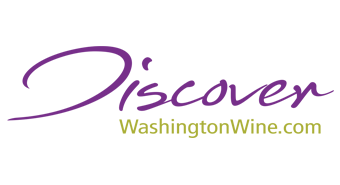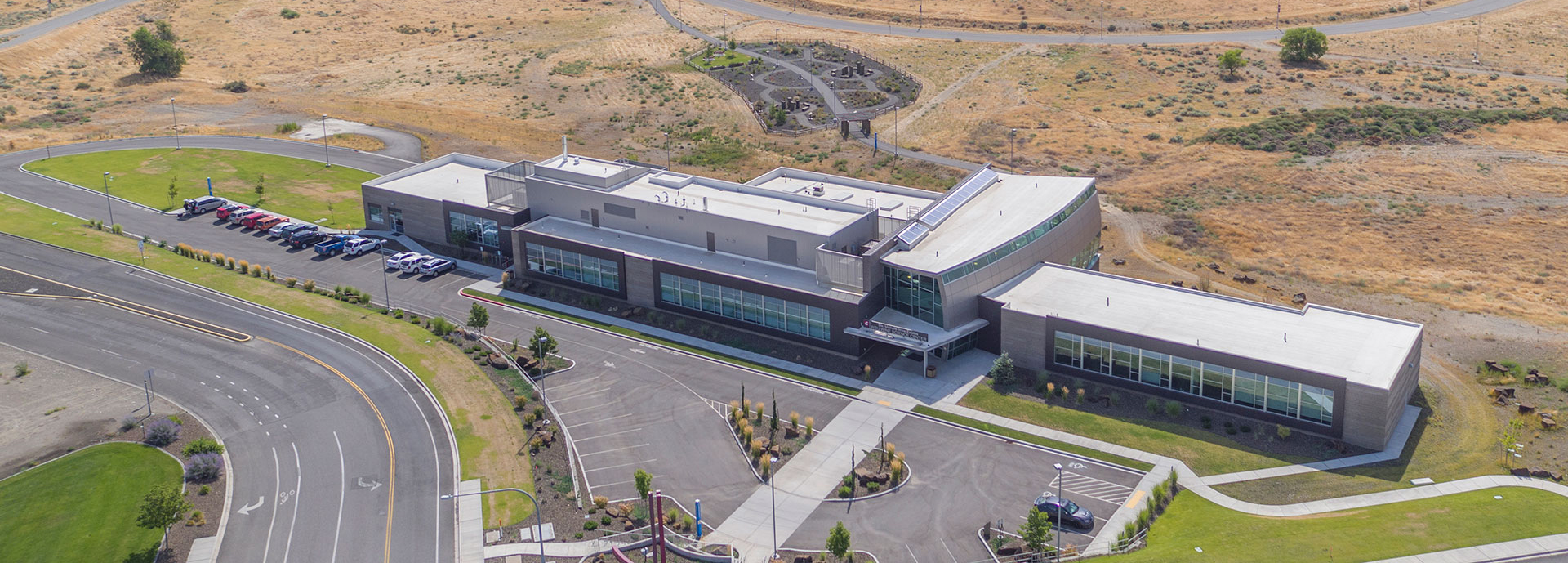Ste. Michelle Wine Estates WSU Wine Science Center:
A Facility Where the Future Stars of Washington Wine Are Born
The Wine Science Center’s total cost was around $23 million and features a teaching winery, labs, classrooms, a two-acre research vineyard, an open atrium gathering area and a wine library curated by the Washington Wine Commission.
By Mark Storer
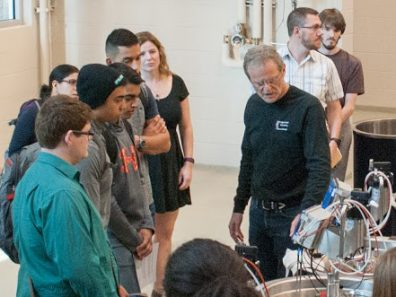
Dr. Thomas Henik-Kling, Professor of Enology at the WSU Wine Science Center, explains to students how to use the Center’s fermenters in the wine making process. According to Dr. Kling, “Teaching students about wine from the ground up is what the Wine Science Center is all about,”
The establishment of the Ste. Michelle Wine Estates WSU Wine Science Center (WSC) at Washington State University’s campus in Richland, WA., is more than just a mouthful to say. It is a game changer for a state ranked number two in the nation when it comes to wine output.
The Wine Science Center is one of only a handful of universities, like University of California, Davis and Fresno State University in California, and Cornell University in New York, among others, that offer an undergraduate degree in viticulture and enology as well as a base for research and graduate studies. It is already providing new and innovative research, while training a new generation of viticulturists and winemakers.
The WSC opened in June of 2015. Its namesake comes from its primary donor, Ste. Michelle Wine Estates. Working with the Washington Wine Commission, the company helped to shepherd the original investment of $7.4 million from all areas of the Washington wine industry and contributed $1 million over five years and an additional $500,000 to complete the center. The Wine Science Center’s total cost was around $23 million and features a teaching winery, labs, classrooms, a two-acre research vineyard, an open atrium gathering area and a wine library curated by the Washington Wine Commission.
The wine library features notable wines from Washington as a historical record of the state’s wine. The library features first vintages, award winners and unique collections that represent the Washington Wine Industry’s rich history. The Wine Commission and WSU continue to add to the collection as the industry grows and matures. EDITOR’S NOTE: It’s worth a visit to the Wine Science Center to see the incredible wines featured in the collection.
“This is a very open and interactive space where faculty, graduate students, undergraduate students and others have the ability to have really open dialogue about what’s happening in the world of agriculture,” said Dr. Jean Dodson Peterson, chair of the Viticulture and Enology Department at Washington State University. “Our faculty members don’t have specific designated labs all to themselves. It’s all collaborative. We really want students and faculty to work together as a team. We’re sharing space and ideas in real time, and we want the WSC to be a place where there are no silos. We’re all coming to the table and having discussions in a natural way.”
Dodson Peterson came to WSU from Cal Poly, San Louis Obispo after earning her doctorate degree from U.C. Davis. She explained that the Center is not just for viticulture and enology students. Biology and chemistry students, among others, are able to use the center for various research projects and lessons.
“The WSC is also a space for members of the wine industry to meet,” said Dr. Henick-Kling. Professor of Enology at the Richland campus. “Our industry partners intended this space also to be a place where industry groups can meet and where industry members exchange ideas and knowledge with students and faculty. This is why we have the beautiful, large atrium.”
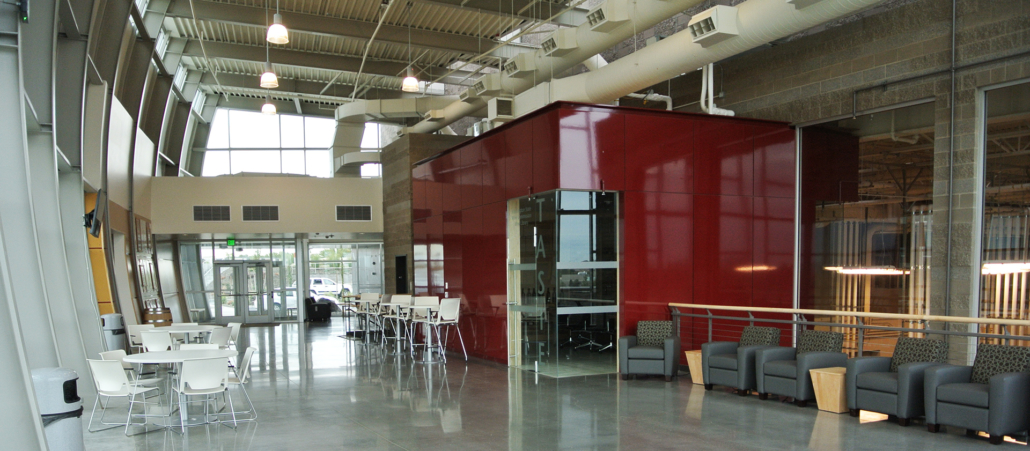
The atrium of the Wine Science Center is a large, open, inviting space where faculty and students, visitors, etc. can have open dialogue about what’s happening in the world of Washington wine making.
Half of the WSU Viticulture and Enology faculty is based in Prosser, WA., at the WSU Irrigated Agriculture Research and Extension Center, which features a large research vineyard and specialized labs for plant physiology, pathology, entomology and soil science. The other half is located at the WSC in Richland. “Most of our students at the Richland campus are actually a bit older. They’re usually over 25,” said Dr. Henick-Kling, “They usually come straight to the Tri-Cities campus.”
Henick-Kling is originally from Germany and got his wine education quite literally across the world. “There was only one program in Germany at that time,” he said. He got a Bachelor’s degree in Germany, but then moved to the U.S. “I ended up studying microbiology at Oregon State University and my Master’s research was on starter cultures for malolactic fermentation,” Henick-Kling explained. He then went to Australia and got his Ph.D. at the University of Adelaide, then returned to the U.S. to become the inaugural professor of Enology at Cornell University in New York. He worked again in Australia before coming to Washington State University in 2009.
Currently, about 80 students are enrolled in the undergraduate program in Richland and at WSU’s main campus in Pullman, WA. The program culminates in a Bachelor of Science degree in Viticulture and Enology.
“Covid was bad for university and community college enrollments. We’re seeing more return, though,” said Henick-Kling. There are also two online programs that feature a certificate of graduation that is interactive. The department also has both a Master’s and Ph.D. program. Currently, 25 students are in the graduate program, with half pursuing a Ph.D.
“These programs also have three weekends where the students get to do some hands-on work together,” Henick-Kling said. “If it’s viticulture, those students get to work in the vineyard, and if it’s winemaking, then in the lab and analysis. We work with external wineries for our undergraduate students, who all have to serve an internship.”
Henick-Kling teaches a class called “Blended Learning” as well as the internship classes, during which students get to make their own wine. “Students discuss what wines they want to make in the spring semester and figure out what they need to make these wines, and then carry that out in the Fall,” he said. Students can source grapes from any vineyard in Washington and then can produce the wine at the WSC, along with other wineries where students have done internships. “We want them to have as much experience in the real world as possible,” Henick-Kling said. A collection of student-made wines is available to purchase through the WSC’s online wine store at: www.store-wine.wsu.edu/wine.
Dr. Kling also teaches in the Enology Certificate Program and conducts seminars and workshops for the wine industry.
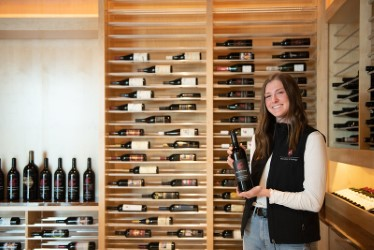
While visiting the Wine Library at WSU’s Wine Science Center, graduate student Megan Mchard proudly shows off a bottle of wine she made in the school’s Blended Learning class taught by Dr. Thomas Henik-Kling. Student made wines can be purchased through the school’s on-line store at: store.wine.wsu.edu/wine.
Annette Loring is a student at the WSC and will receive her Bachelor’s degree in Viticulture and Enology in May of this year. She said the low teacher-to-student ratio is important to her, among other aspects of the degree she’s earning. “I was a dental hygienist for 18 years beforehand,” she said. “I wanted to do something different.”
Loring grew up on a farm and was no stranger to growing things and being around an agricultural environment. “It’s such a multi-layered area,” she explained. “There’s so much that goes into it. The more I learn about wine, the slower I need to sip my own wine and think about all that passion and hard work that went into it.” Loring said she is realistic about her impending career, adding: “I came to this a little bit older, and so while it would be great to make my own wine at some point, I’d really like to work with a team and collaborate on making a quality product.”
Loring said that during the first week of classes, which were online due to lockdowns, she was able to talk with professors in a small group to ask questions and get answers. During that discussion, she was told that internships were available with the WSC itself, and she applied and got one. She works with graduate students helping conduct lab research and producing research wines. “It’s been really formative of my education here, having that hands-on learning,” she said. “I encourage people in the program to get an internship directly here with the university. It’s probably been the most valuable part of my education.”
Dane Day is the red winemaker at Columbia Crest Winery in Patterson, Washington and a graduate of WSU’s Viticulture and Enology program. The WSC was not yet finished while he was a student. Working in restaurants in Arizona introduced him to the wine industry and Day began to research where he could get a winemaking education while working. “I had family in Washington, and so I looked at WSU and really liked what they offered,” he said. “My time there was really great. It was an opportunity to intern at wineries and I learned so much.” Day was in the first offering of Henick-Kling’s Blended Learning class, and he was the one to suggest the name of “Blended Learning” for the class’s name. “That was my first experience with winemaking, so I have a soft-spot in my heart for all that.”
Day did both viticulture and winemaking internships and said both were invaluable. “I was there before the WSC opened, but I was really intrigued that they were building one and honestly, it’s one of the things that attracted me to WSU. I got to see it being built and go to the groundbreaking, and seeing what’s come out of it since has been really wonderful.”
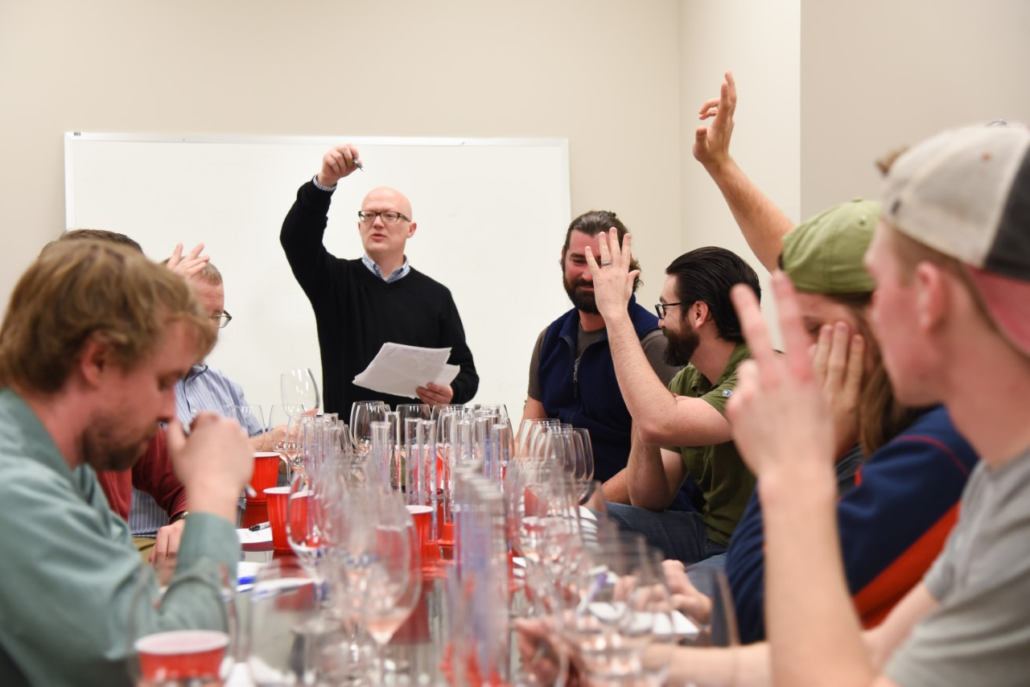
As you might suspect, one of the most popular classes at WSU’s Wine Science Center is a class taught by Dr. Jim Harbertson about learning the intricacies of tasting wine in the school’s wine sensory laboratory.
Andrew Schultz also attended WSU before the center was built, though he did not obtain a degree. He owns Brothers in Farms, a company that oversees vineyard management on Red Mountain in eastern Washington, as well as in Oregon. Schultz, who has been published as a co-author for WSU’s research, supplied some of the first fruit to the Wine Science Center when the first wines were being produced. He also has employed a couple of interns from the WSC. An Army veteran, he began farming grapes when he returned from the service.
“We had some really good teachers at WSU,” Schultz said, while commenting that the grounding he got in viticulture was the most important part of his education and he got a very deep understanding of that. “Studying the plant was key. You get good wine by studying the plant. The plant has genetics, which equal the rules in the world. If you know those, then you know how the plant is going to act,” he said.
For his part, Henick-Kling said that teaching students about wine from the ground up, quite literally, is what the WSC is for. “Washington produces a huge diversity of wines, and we’re still not done exploring,” he said. “We’re not planting every grape variety in one place anymore, we’re spreading out and adapting vineyard management practices for each place. So we’re doing a lot of work trying to understand how these physiological interactions work and how the vineyard managers can produce consistently diverse, high quality fruit.”
Dennis Bonilla grew up on the 230-acre Stillwater Creek Vineyard on Washington’s Royal Slope near Frenchman Hills. Even so, he didn’t think he’d end up getting into wine. His father was the foreman at the vineyard when he was young. “It’s probably why I grew up thinking I didn’t want any of this. I was out working during the summer and doing harvest and crush. It’s hard work,” he said.
But Bonilla got the calling as he got older, and he decided to study viticulture. He learned about the WSC at WSU from his sister while he was a student at Columbia Basin Community College in Pasco, WA. “I learned about the internship programs and I wanted to do that. They were looking for someone to go to the Dominican Republic to do a vineyard internship and I got to do that. It was the first and only vineyard and winery in the country.” Bonilla said the experience was transformative for him. “I got back from the Dominican Republic, and I went back to Stillwater Creek.” He’s now assistant manager of the vineyard.
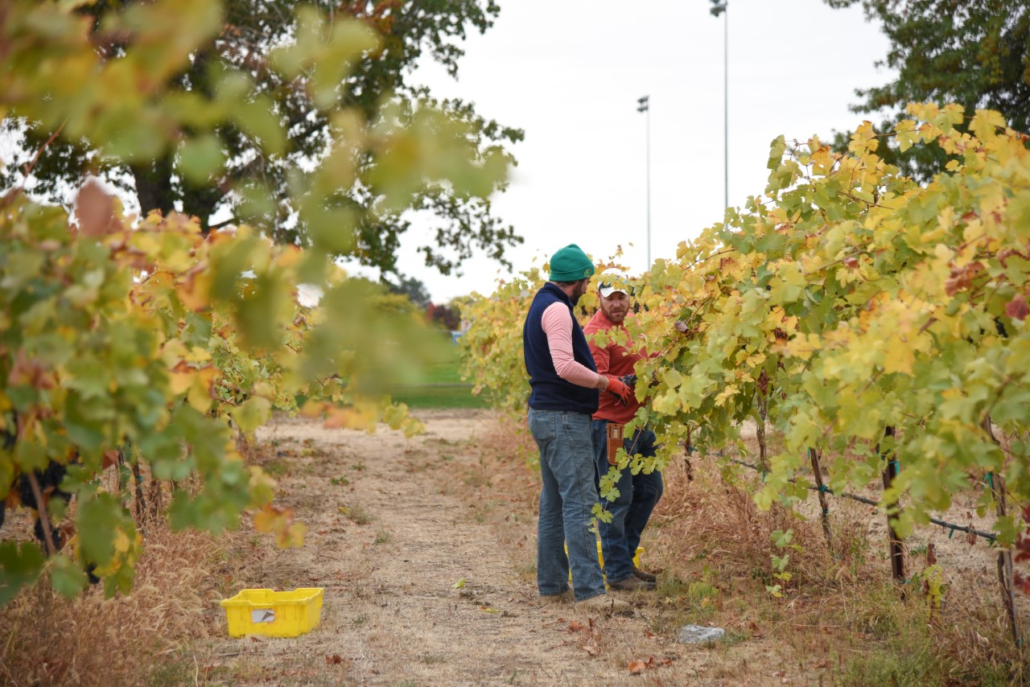
Students at WSU’s Wine Science Center have the luxury of having their own research vineyard right on the school’s campus just off George Washington Way in Richland, WA.
Bonilla graduated from WSU and his senior class was among the first to use the WSC after it was built. “The wine chemistry and microbiology classes were not easy classes, but we were there as a group and we worked together. I think that closeness was important and our group is still all in touch with each other,” he said.
Dr. Tom Collins, who is a researcher and teaches at the WSC, has been collaborating with researchers from U.C. Davis and Oregon State University on a project investigating smoke taint and its impact on grapes. The work has been groundbreaking and has earned accolades from around the wine industry. The research has focused on growing grapes in areas prone to wildfires, which have occurred both in Washington, and across wine growing regions, particularly in Australia and in California. “He won the Wine Enthusiast Star Award for that work,” said Dodson Peterson. “As a team across institutions we’ve come together and we’re focusing on some of the issues that our industry is facing and we’re helping to lead the charge,” she said.
That sense of collaboration is what many in the wine industry say propels it forward. From vineyard to laboratory, working in teams to solve problems, share knowledge and discuss ideas is a focus for winemakers generally. As Loring finishes her degree this spring, she echoed the sentiments. “From the internships to the Blended Learning class, working together with vineyard managers, and winemakers is pretty awesome. You get to work with the people who are out there doing the work,” she said. Loring did a harvest internship at Longship Cellars in Richland, WA., and a lab internship with Four Feathers Wine Services in Prosser, WA., which she says gave her a breadth of experience.
“The access to world class people [at the WSC], like Thomas Henick-Kling and Markus Keller is what helps make this place special,” said Schultz. Keller is a professor of Viticulture at WSU’s Prosser campus and the author of the number one book on plant physiology called The Science of Grapevines. “I talk to Markus on a regular basis and run things by him.”
“The WSC is in a key area where the grapes are being grown and where the people who are doing it are accessible every day,” said Schultz. “It’s those things that set WSU’s wine science program apart.”
Henick-Kling said that WSU’s viticulture and enology department has between eight and 10 faculty members right now and is growing. “We hope to build out the program and add to the research and teaching program and have closer to 15 faculty members.”
As it continues to grow, Dodson Peterson said that the United States viticulture and enology industry is serious about solving the issues it faces, and that the WSC is now a part of that. “Whether it’s about diseases or climate issues in the vineyard, the center was truly designed with student learning, and faculty inspiration at its heart.”
